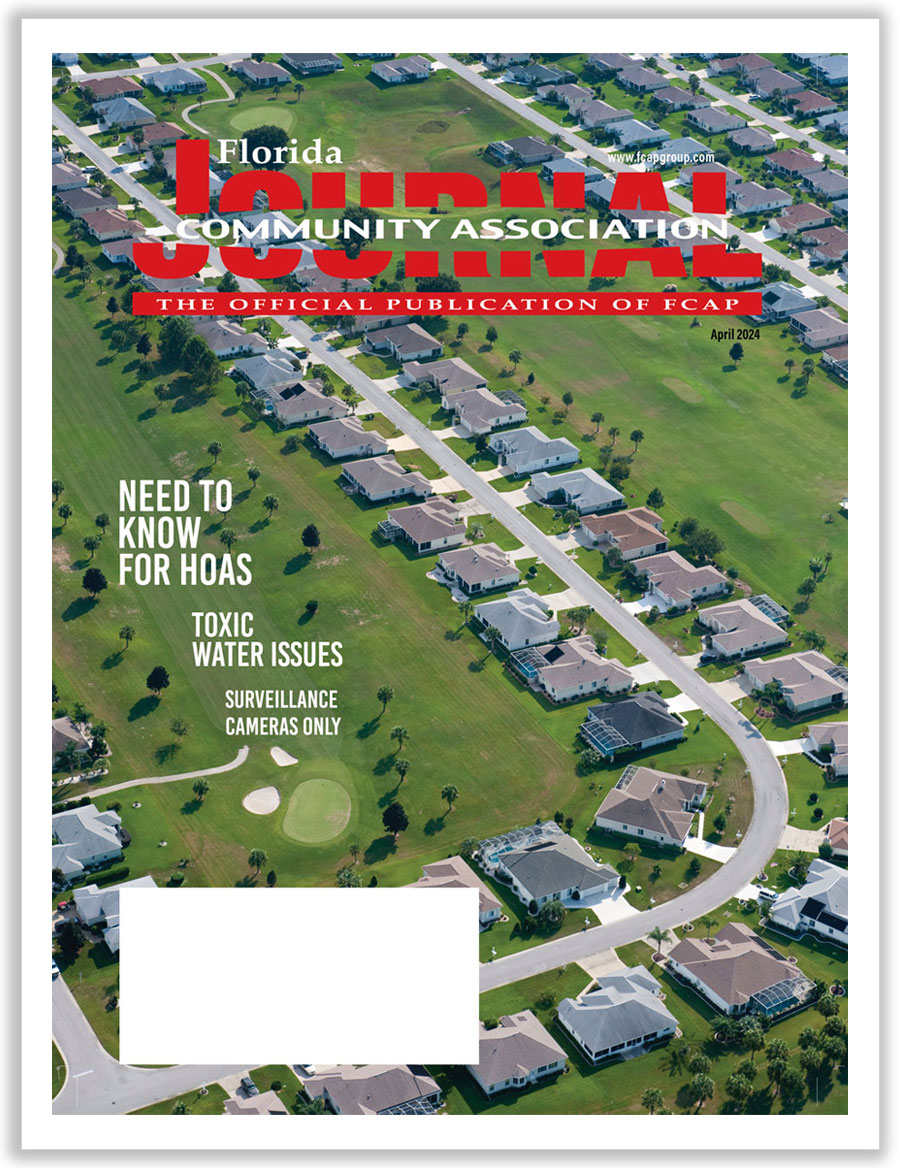
Incorporating Electronic Technology into Association Operations
By Amanda K. Barritt, Esquire / Published July 2020

During the COVID-19 pandemic, most of us have been forced to incorporate greater use of technology to conduct our business. For many associations, some tasks have been done for the first time using electronic technologies, such as video meetings under the exceptions permitted by the board’s emergency powers.
Conducting business by electronic means can increase efficiency and save paper, money, and storage space. Now that we are all getting used to conducting more business solely by electronic means, boards and managers may be wondering what they can do under the law to continue to use technology to operate their associations under “normal” circumstances. Here are some reminders of what is permitted under the Florida Statutes.
Meeting Notices
Email can be used to provide meeting notices only for owners who have consented in writing to accept notices by electronic means and who have provided an email address for that purpose. Meeting notices must also still be posted in a conspicuous place on the property if otherwise required. In addition to mailing, hand delivering, or emailing notices, an association may adopt a procedure for conspicuously posting and repeatedly broadcasting the notice and agenda on a closed-circuit cable television system serving the association. If used, the broadcast notice and agenda must be broadcast in a manner and sufficient length of time so as to allow an average reader to observe, read, and comprehend the entire content.
Websites
Condominium associations that manage 150 or more units and that do not contain timeshare units are required to have a website and to post digital copies of certain documents on the website. In additional to other requirements found in Section 718.111(12)(g), Florida Statutes, the website is required to include a private portal that is accessible only to unit owners and employees of the association.
[adrotate group=”1″]
The association must provide a unit owner, upon request, with a username and password for access to the protected portal that contains copies of the documents required to be on the website. In addition to the declaration of condominium, bylaws, articles of incorporation, and rules and regulations, the access-protected portion of the website must include the annual budget and any proposed budget to be considered at the annual meeting, certain financial reports and statements, copies of certain contracts and lists of certain contracts and bids, director certificates, meeting notices and agendas, and documents to be considered at upcoming meetings.
The association must ensure any information and records not subject to inspection by the owners, such as attorney-client privileged information and personnel records, are not posted. Homeowners associations are not required to maintain websites at this time, but if they choose to, it is recommended that similar procedures for protecting access to association records be adopted by the board and followed.
File Storage
Official records for both condominiums and homeowners associations are required to be kept within the state and available for inspection by owners within 45 miles of the community or within the county in which the community is located. Owners’ records inspection requests can be satisfied by the association offering the option of making the records available to an owner electronically via the internet or by allowing the records to be viewed in electronic format on a computer screen and printed upon request.
Accordingly, associations may adopt a policy to store at least some of their records electronically in a cloud-based system, which may be more economical by saving filing space and money. However, prior to moving toward a primarily electronic storage system, a board should carefully analyze and consider with its proposed vendor the mechanisms to be used to maintain security and privacy and to back up the records. The documents must be available in order to comply with the statutes and to be able to respond to owner requests for inspection of records.
It is also essential that the board ensure the documents are kept secure and any private information (such as personnel records, contact information not permitted to be disclosed, information obtained for approval of leases or sales, and attorney-client privileged information) is kept private. Should electronically filed documents be lost, the board will want to show it took reasonable steps to do its best to ensure the documents would be safe and available. Once the documents have been converted to electronic storage, certain original documents may need to be retained, such as hard copies of original governing documents and current copies of active contracts.
Prior to implementing an electronic storage policy, the board should consult with its legal counsel to ensure the proper procedures are followed and approvals obtained, and for advice as to what documents should not be destroyed.
Voting and Electronic Meetings
The Florida Statutes authorize associations to conduct member votes, including elections, using an internet-based online voting system if certain criteria are met. The Division of Florida Condominiums, Timeshares and Mobile Homes adopted rules to provide further guidance for electronic voting for condominiums and cooperatives. Since owners voting electronically are counted as being in attendance for purposes of determining a quorum, it is possible to conduct meetings virtually, which may require using a combination of online voting, paper ballots and/or proxies, and video conferencing. Certain notices and procedures are required for an association to use electronic voting, an owner’s consent to vote electronically must be obtained, and the consent can be revoked.
Prior to implementing electronic voting and video conference meetings, boards should consult with their legal counsel to ensure they understand and follow the legal requirements to hold a valid meeting and vote. Consider a few additional important points:
- When a quorum is established based on owners voting electronically, a substantive vote may not be taken at the meeting on issues other than the issues specifically identified in the electronic vote.
- For condominium associations, the polls are closed upon commencement of opening of the outer envelopes of mailed ballots or the accessing of electronic votes, whichever occurs first.
- The online voting system must store votes accessible to election officials for recount, inspection, and review purposes (for condominiums for one year, and for homeowners associations for seven years).
- For condominiums the online voting system must produce an official record that the association must maintain which identifies the specific votes cast on each ballot and the date and time of receipt of the electronically submitted ballot.
- The system must be able to authenticate the owner’s identity but permanently separate identification information from the electronic ballot for condominium elections or votes that require secret ballots.
Association law certainly gives associations the ability to conduct many aspects of its operation electronically, increasing efficiency and reducing cost and storage space. However, associations should use caution and work closely with their management, vendors, and legal counsel to ensure the necessary procedures and systems involved in their use of technology meet the statutory and administrative criteria and promote the best interests of the community.
Amanda K. Barritt
Henderson Franklin
Amanda K. Barritt is Florida Bar Board Certified in Condominium & Planned Development Law and serves as chair of the firm’s Real Estate and Condominium and Homeowners’ Associations Practice Group. She represents residential and commercial condominium, homeowners’ and property owners’ associations, non-profit social and recreational clubs, developers, builders, and individuals. Amanda may be reached at amanda.barritt@henlaw.com or by phone at (239) 344-1108.





